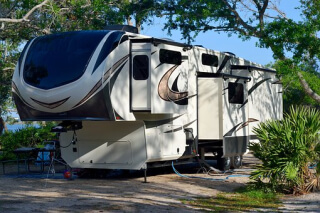Do I Have to Pay My Spouse’s Loan When He Dies?

No, you are not personally responsible for repaying debts that are not part in your name or related to joint ownership. In the state of New Jersey, there are some exceptions including “necessary” goods and services, with healthcare debts being the most common example.
At the same time: yes, the estate itself is responsible for paying off unpaid debt to the best of its ability. This may mean that an asset like a financed RV — one with a loan that has not yet been paid off — may need to be liquidated in order to pay off the creditor.
Situations can vary greatly, and the question of joint ownership or obligation can get murky when some marital properties are involved. Van Dyck Law Group can review your situation and recommend the best courses of action. Our experienced New Jersey estate planning and probate attorneys will gladly assist you in understanding your available options. Schedule a risk-free, confidential case review with no obligation when you call 609.580.1044 or contact us online.
If You Co-Sign a Loan or Have a Joint Credit Account, You Are Obligated to Repay After a Spouse’s Death
One fairly cut-and-dried situation to be aware of is when you have co-signed a loan with your spouse or you have been registered as a joint account holder on a line of credit or a credit card. In situations like these, your name is listed as an obligator, meaning you are expected to pay even if one or more co-debt holders pass away.
Certain “Necessary” Expenses Must Be Repaid by the Surviving Spouse
The state of New Jersey has a bit of an unusual law in that it considers “necessary” expenses that benefit both members of a married couple to be considered as joint debt. Examples include legal fees for estate planning, clothing, and most commonly the costs of medical care. In the event of a spouse’s death, the surviving spouse will be obligated to repay any outstanding debts related to these “necessary” expenses, regardless of whether or not their name appears on any bill or agreement to pay. This obligation has been upheld in several New Jersey court decisions.
Note, though, that these necessary expenses will force a surviving spouse beneficiary of a life insurance policy or retirement funds to use the benefit money to repay the debts. The beneficiary will also have to repay if they are a co-signer or obligor for a debt.
The Estate Is Obligated to Repay Debts With Available Funds
An estate is created from all of the assets and other holdings of the decedent. The estate exists as its own legal entity, separate from the surviving spouse’s. In effect, the estate is treated as a legal extension of the now-deceased spouse, meaning that the estate itself is responsible for any debts or obligations held by the decedent, to the extent reasonably possible.
If a spouse has unpaid debts then the corresponding creditor can make a claim upon the estate compelling it to repay the debt. This forced repayment can change plans for how money and other assets were to be distributed to beneficiaries. In the state of New Jersey, the estate is obligated to pay the funeral director first, administration costs including court fees next, and then any creditors afterward. All of these payments are made before any beneficiaries begin inheriting property.
The executor of the estate is responsible for managing creditor claims and repaying to the best of their ability. If the estate does not have enough money to pay off all creditor claims, then it must liquidate all assets, excluding the spousal/family allowance and personal property exemptions. The proceeds of this liquidation must then be distributed pro-rata to all creditors in the same tier of priority, meaning they get paid in proportion to the size of the outstanding debt.
Often, the executor of an estate will be the surviving spouse. However, if the surviving spouse is not the executor, then they are not directly responsible for repaying the debt. The only consequence to them is if an asset they inherited had an outstanding debt attached, which may force the estate to liquidate the asset in order to repay the creditor.
What About This RV/Car/Home I Now Own?
Revisiting the example of the RV, let’s say a spouse goes out and buys an RV, signing a loan just in their name. Then, the RV loan is not going to be considered joint marital debt, nor is the cost of the purchase considered a “necessary” expense under New Jersey law.
However, the estate does still owe that money to the lender. The executor may be forced to sell the RV, especially if they are also the beneficiary who was supposed to receive the RV.
Put even more simply: if someone’s husband buys an RV, dies without paying it off, and then bequeaths it to their widow who is also the executor, then the widow must decide whether to continue making payments on the loan to keep the RV or to sell the RV in order to pay off the loan (to the extent possible).
Manage Your Spouse’s Estate With New Jersey Probate Lawyers
Death almost always catches us by surprise, and it can leave us reeling in more ways than one. If you find yourself managing your spouse’s estate and outstanding debts while still managing your own grief from the loss, then know that there are experienced New Jersey estate planning attorneys who want to help.
Contact Van Dyck Law Group to speak with a compassionate and knowledgeable attorney. We will explain the laws relevant to your situation, reveal what legal strategies you have available in response, and guide you towards the options that lie in your best interests.
Start the process of moving forward now when you call 609-580-1044 or contact us online to schedule your no-obligation appointment.

